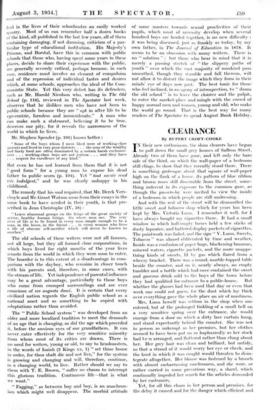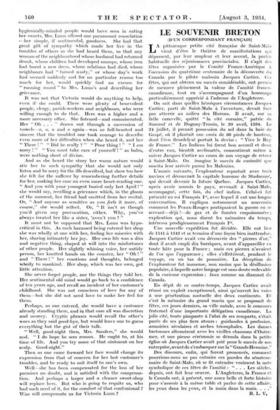CLEARANCE
By RUPERT CROFT-COOKE IN their new enthusiasm, the slum clearers have begun to pull down the small grey houses of Saffron Street. Already two of them have gone, and left only the bare side of the third, on which the wall-paper of a bedroom still clings, to show that they recently stood there. There is something grotesque about that square of wall-paper high on the flank of a house, its pattern of blue ribbon and brown roses still discernible from the street, some- thing indecent in its exposure to the common gaze, as though the passers-by were invited to view the inside of a bedroom in which people are still undressing.
And with the rest of the street will be dismantled the little sweet and tobacco shop which for years has been kept by Mrs. Victoria Lunn. I remember it well, for I have always bought my cigarettes there. R. had a small window in which half-empty boxes held a few sticks of dusty liquorice, and battered display packets of cigarettes. The paintwork was faded, and the sign " V. Lunn, Sweets, Tobacco" was almost obliterated by time and weather. Inside was a confusion of paper bags, blackening bananas, mineral waters, cigarette packets, and the more unappe- tizing kinds of sweets, lit by gas which flared from a wheezy bracket. There was a round, marble-topped table beside the counter, and on it, nearly always, an empty tumbler and a bottle which had once contained the sweet and gaseous drink sold to the boys of the town before they had qualified for entrance to a public-house. But whether the glasses had hem used that day or even that week one could not guess, for the dust which lay thick over everything gave the whole place an air of mustiness.
Mrs. Lunn herself was seldom in the shop when one entered, but at the prolonged tinkling of a small bell on a very sensitive spring over the entrance, she would emerge from a door on which a dirty lace curtain hung, and stand expectantly behind the counter. She was not in person as unkempt as her premises, but her clothes seemed to have been put on as haphazardly as her stock had Lean arranged, and fluttered rather than clung about her. Her grey hair was clean and brilliant, but untidy, so that a strand of it would worry her eye or cheek, and the knot in which it was caught would threaten to disin- tegrate altogether. Her blouse was fastened by a brooch with almost embarrassing carelessness, and she wore, or rather carried in some precarious way, a shawl, which continually impeded her search for the articles demanded by her customers, Yet, for all this chaos in her person and premises, for the delay it caused and for the danger which efficient and hygienically-minded people would haVe seen in • eating ' her sweets, Mrs. Lunn offered one paramount consolation -her simple, if sentimental, goodness. She had that great gift of sympathy which made her live in the troubles . of others as she had heard them, so that any woman of the neighbourhood whose husband had returned drunk, whose children had developed mumps; whose iron had burnt a new dress, whose relations had died, whose neighbours had "turned nasty," or whose day's work had seemed suddenly and for no particular reason too mueh for her, would quickly find an excuse for "running round" to Mrs. Lunn's and describing her grievance.
It was not that Victoria would do anything to help, even if she could. There were plenty of benevolent people, clergy, parish-workers and neighbours, who were willing enough to do that. Hers was a higher and a more necessary office. She listened—and commiserated.- Her "Oh . . . " drawn out through a succession of vowels—a, o, u and o again—was so full-hearted and sincere that the troubled one took courage to describe even more of her difficulties when she heard it, and her " There ! " "Did he really ? " "Poor thing ! " " I am sorry ! " "You must take care of yourself ! " as balm, were nothing short of divine.
And as she heard the story her warm .nature would stir her to such sympathy that she "would not only listen and be sorry for the ills described, but show too how she felt for the sufferer by remembering further details for her, making her case an even more heart-rending one.
"And you with your youngest buried only last April ! "
she would say, recalling a grievance which, in the gloom of the moment, her friend had omitted from her recital.
Or, "And anyone as sensitive as you feels it more, of course," she would reflect. Or, " It isn't as though you'd given any provocation, either. Why, you've always treated her like a sister, 'aven't you ? "
It must not be supposed that Mrs. Lunn was hypo- critical in this. As each harassed being entered her shop she was wholly at one with her, feeling her miseries with her, sharing intimately her joy. Her own life was a dim and negative thing, shaped at will into the misfortunes of other people. Her slightly whining voice, her untidy person, her knotted hands on the counter, her " Oh ! " and " There ! " her emotions and thoughts, belonged Wholly to mankind. Her shop, which was her own, got little attention.
She never forgot people, nor the things they told her. Her sentimental old mind would go back to a confidence of ten years ago, and recall an incident of her customer's childhood. She was not conscious of love for any Of them—but she did not need love to make her feel for them.
Perhaps, as one entered, she would have a customer already standing there, and ia that case all was discretion and secrecy. Cryptic phrases would recall the other's woes as they said good-bye, but would leave one to guess everything but the gist of their talk.
"Well, good-night then, Mrs. Sanders," she would nod. "I do hope he sees reason. He ought to, at his time of life. And you try some of that ointment on her scalp. Good-night."
Then as one came forward her face would change its expression from that of concern for her last customer's troubles, and be ready to suit itself to one's own.
Well—she has been compensated for the loss of her premises no doubt, and is satisfied with the compensa- tion. And perhaps a larger and a cleaner sweet-shop will replace .hers. But who is going to requite us, who had such need of it, for the comfort of that confessional ? Who will compensate us for Victoria Lunn ?































 Previous page
Previous page